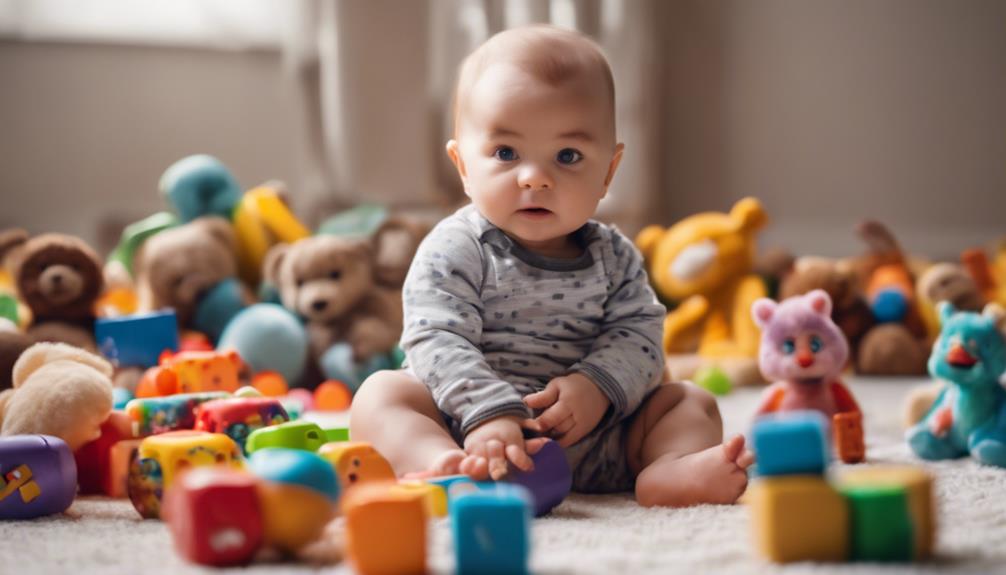Explore the amazing realm of infant growth, as important achievements at four months pave the way for social interactions and cognitive advancement. Support their sensory development and boost motor skills through fun playtime activities. It is crucial to establish healthy sleep habits from the start to promote overall wellness. Engage in tummy time exercises to improve coordination, and keep track of milestones to ensure timely assistance for any delays. Embrace this journey with your little one, guiding their development every step of the way.
Key Takeaways
- Interactive play supports physical and social development.
- Attachment forms emotional security and trust.
- Cognitive skills develop through memory, learning, and problem-solving.
- Motor skills progress from grasping to walking.
- Sensory experiences aid cognitive development and emotional bonding.
Milestones at Four Months
By four months, babies typically exhibit significant developmental milestones that showcase their growing awareness and physical abilities. At this stage, your baby may smile in response to stimuli and watch movements attentively. They're able to focus on a toy for several seconds and might even push up onto their elbows or forearms during tummy time. Physical development milestones include increased interaction with their surroundings and improved control over movements.
To support your baby's progress at four months, engaging in interactive play is essential. This not only fosters their physical development but also strengthens the bond between you and your little one.
By providing safe exploration opportunities, you can further encourage their curiosity and motor skills.
Social Development

By 4-6 months, babies enjoy interactive games like peek-a-boo, signaling the beginning of their social development.
Infants may show interest in other babies around 7-9 months, indicating a growing awareness of social interactions.
Mimicking others' actions around 10 months demonstrates early social learning skills.
Early Social Interactions
During early social interactions in baby development, interactive games like peek-a-boo become enjoyable around 4-6 months, nurturing important social connections.
As your baby grows and develops, these early interactions play a vital role in shaping their social skills. Around 7-9 months, you may notice your little one showing interest in other babies, a sign of developing social connections.
By 10 months, your baby might start imitating actions, indicating the beginning of social learning and engagement. Simple gestures such as waving bye-bye can emerge by 11 months, showing early signs of social awareness and communication skills.
Attachment and Bonding
Attachment and bonding between caregivers and babies begin to form in the first few months of life, establishing a foundation for emotional security and trust. These early interactions are important for the development of secure attachment, which is fundamental for a baby's social and emotional well-being.
Caregivers play a significant role in nurturing these emotional bonds through responsive and sensitive caregiving. When babies form secure attachments, they feel safe and develop confidence in exploring the world around them.
As babies grow, they display attachment behaviors such as seeking comfort from familiar caregivers and showing distress when separated from them. These behaviors are signs of a healthy attachment bond. Secure attachment sets the stage for healthy social and emotional development in infants, shaping their future relationships and overall well-being.
Cognitive Skills
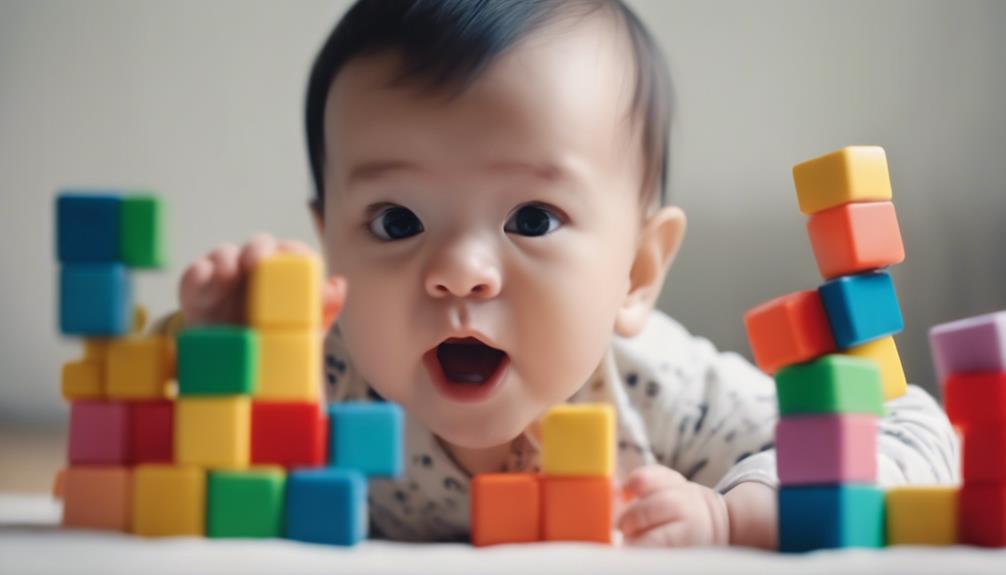
Your baby's cognitive skills encompass memory, learning, and problem-solving abilities. These mental processes are shaped by their experiences, interactions, and sensory input.
As you observe your infant recognizing faces, responding to sounds, and exploring objects, you witness the early stages of their cognitive development unfolding.
Memory and Learning
Understanding how memory and learning develop in babies is essential for their cognitive growth and early development. Babies as young as 6 months begin forming memories, which can last up to a week. Memory and learning in infancy play a significant role in later cognitive development, as babies use information from their surroundings to establish foundational skills.
Simple activities like peek-a-boo can enhance memory and learning by fostering social interaction. Additionally, repetition and routine aid in memory formation, helping infants establish connections and patterns in their experiences. Positive interactions, responsive caregiving, and exposure to diverse stimuli further enhance cognitive skills like memory and learning in babies.
Problem-Solving Abilities
Fostering problem-solving abilities in babies typically begins around 6 months of age as they start grasping simple cause and effect relationships. Infants as young as 8 months old may start demonstrating early problem-solving skills in their interactions and play. These skills continue to improve as babies actively explore their environment and engage in supervised activities.
Encouraging safe exploration and providing learning opportunities can enhance a baby's cognitive development and problem-solving abilities. As babies approach their first birthday, you may notice early signs of problem-solving as they try to figure out how things work or fit together. By creating a supportive environment that allows for exploration and interaction, you can help nurture your baby's problem-solving skills and contribute to their overall cognitive development.
Motor Skills
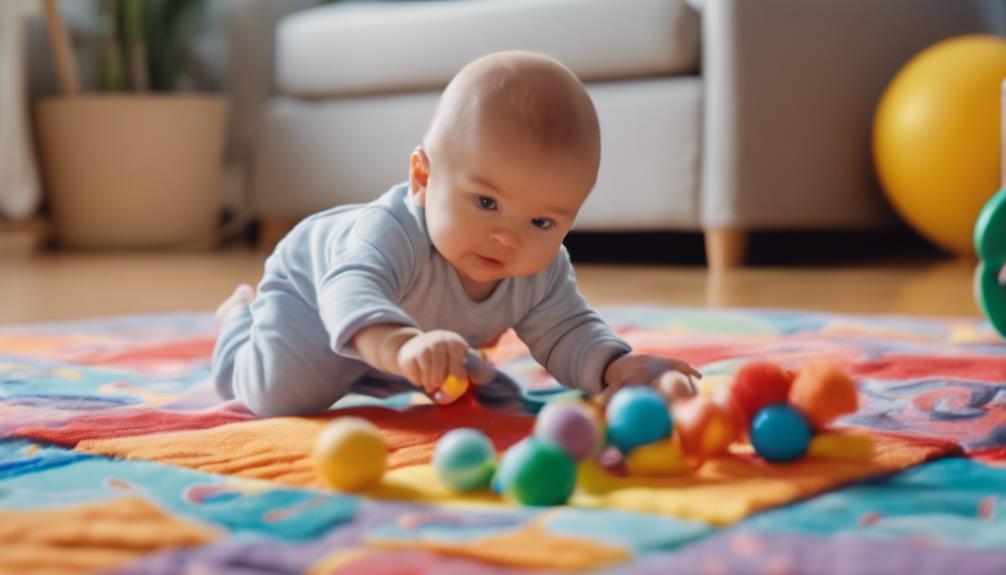
Motor skills in infants progress gradually, starting with fundamental movements like grasping and reaching for objects. As babies grow, their motor skills continue to develop, reaching significant milestones that showcase their coordination and strength.
Here are some key points to keep in mind:
- By around 6 months, most babies can sit without support, indicating an important improvement in their motor skills.
- Around 9 months, babies often start pulling themselves up to stand, demonstrating increased coordination and muscle strength.
- At approximately 12 months, many babies take their first steps, highlighting the culmination of their motor skill development.
- Motor skills evolve from simple actions like picking up small items with thumb and forefinger to more complex movements as babies progress.
Understanding the progression of motor skills in infants is essential for tracking their development and ensuring they reach these milestones at an appropriate pace.
Sensory Awareness
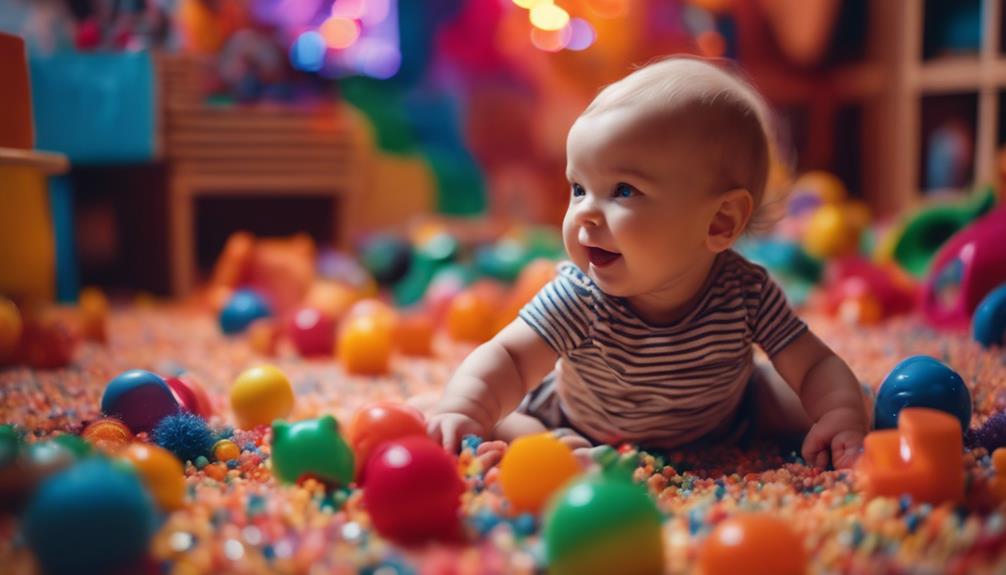
Through their senses, babies develop sensory awareness as they interact with the world around them. Sensory experiences are essential for babies as they start to understand their surroundings. These experiences help in cognitive development and emotional bonding with caregivers.
Activities like tummy time, feeling different textures, and listening to music all contribute to the stimulation of sensory development in infants. By engaging in various sensory activities, babies can enhance their sensory awareness, which forms the basis for future learning and communication skills.
As babies explore their environment through touch, sight, sound, taste, and smell, they're building a foundation for understanding the world. It's fundamental for caregivers to provide opportunities for sensory exploration as it not only aids in sensory development but also strengthens the bond between the baby and their caregivers.
Encouraging sensory awareness in infants is an integral aspect of their overall development.
Feeding and Nutrition

To guarantee the best growth and development, understanding the importance of feeding and nutrition for babies is essential. In their first year, babies rely on breast milk or formula as their primary source of nutrition, typically consuming 24-32 ounces per day.
Introducing solid foods around 6 months of age is important to meet their nutritional needs and foster the development of eating skills. Common first foods include iron-fortified cereals, pureed fruits and vegetables, and small amounts of meat or alternatives.
As babies grow, gradually increasing the variety and textures of foods offered supports their overall growth and development. It's crucial to ensure that babies receive the necessary nutrients to thrive and learn healthy eating habits from an early age.
Sleeping Patterns

Understanding baby sleeping patterns is essential for ensuring they get adequate rest for their development and well-being. Newborns typically sleep 14-17 hours a day, in periods lasting 2-4 hours. As they grow, by 6 months, babies might sleep 9-12 hours at night with 2-3 naps during the day. Establishing a bedtime routine can help regulate a baby's sleeping patterns. Around 4 months, babies may begin developing more regular sleep cycles. Consistent sleep schedules and creating a conducive sleep environment can support healthy sleeping habits in babies.
| Sleep Stage | Description |
|---|---|
| Newborn | Sleeps 14-17 hours a day, in shorter 2-4 hour periods. |
| 6 Months | Sleeps 9-12 hours at night with 2-3 naps during the day. |
| Sleep Cycles | Around 4 months, babies start developing more regular sleep cycles. |
Tummy Time Activities

Engage your baby in tummy time activities to promote healthy development of their muscles and motor skills. Tummy time isn't only beneficial for physical growth but also essential for cognitive and emotional development. Here are some activities you can try with your baby:
- Rolling Over: Encourage your baby to roll from tummy to back and vice versa to enhance motor skills.
- Reaching for Toys: Place colorful toys within reach to boost coordination and strengthen arm muscles.
- Mirror Play: Use a mirror during tummy time to help your baby develop head control and build confidence.
- Crawling Obstacles: Place soft pillows or cushions for your baby to crawl over, stimulating core muscles.
- Sensory Exploration: Introduce textured fabrics or safe toys for tactile exploration, fostering curiosity and sensory development.
These activities not only aid in muscle development but also support your baby's exploration of the world around them, building their confidence in movement and interaction.
Monitoring Development
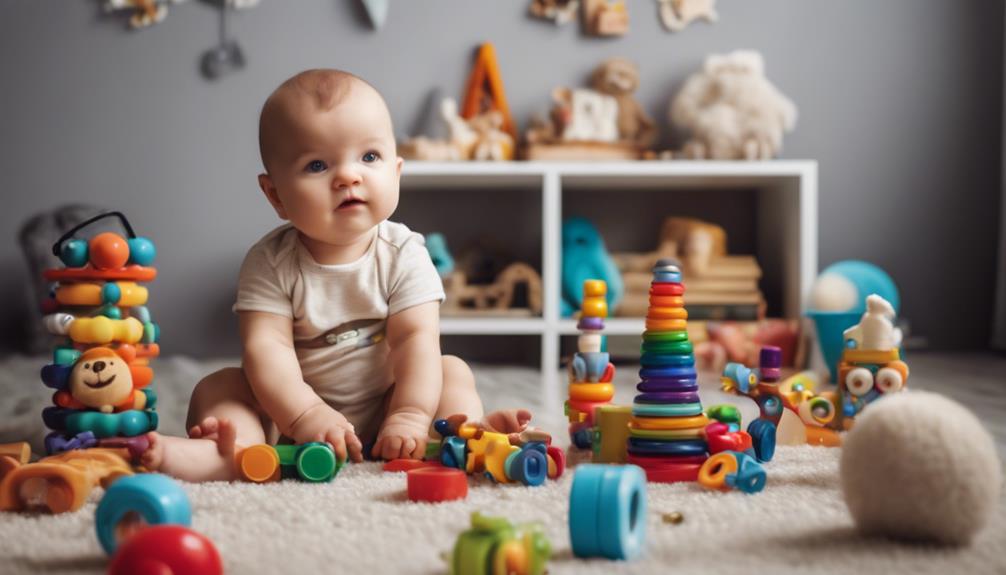
Monitoring your baby's development involves tracking key milestones and utilizing milestone checklists to assess progress. From the first smile to rolling over and babbling, these milestones indicate healthy development in various areas such as motor skills, communication, and social interactions. Caregivers play an essential role in observing and documenting these milestones, noting any delays or concerns that may arise.
Early intervention is important if developmental milestones aren't met on time, emphasizing the significance of regular communication with your pediatrician. By staying informed and proactive in monitoring your baby's development, you can address any issues promptly and make sure that they receive the necessary support.
Tools like the CDC's Milestone Tracker App can also aid in tracking and documenting your baby's progress, providing valuable insights for both you and your healthcare provider. Collaborating with your pediatrician and utilizing available resources can help you navigate your baby's developmental journey with confidence and care.
Frequently Asked Questions
What Are the Baby Stages From 0 to 12 Months?
You asked about the stages from 0 to 12 months. From smiling and rolling over to babbling and sitting with support, babies progress through milestones like crawling, self-feeding, and engaging in pretend play.
What Are the 5 Milestones of Infant Development?
Explore further into the 5 milestones of infant development: physical prowess, cognitive acumen, emotional connections, social skills, and communication conquests. From sitting solo to babbling bliss, your little one's growth is a marvel.
What Are the Main Stages of Baby Development?
Explore the key stages of baby development, including sensory responses, motor skill growth, social interactions, and cognitive advancements. Each milestone achieved leads to increased mobility, communication, and independence for your little one.
What Is the Normal Development of a Baby?
You should monitor your baby's progress, trust your instincts, and consult a pediatrician if milestones are not met. Developmental stages include smiling, tracking objects, rolling over, babbling, crawling, self-feeding, saying words, and pretend play.
Conclusion
To sum up, your baby's development at four months is like a blossoming flower, growing and flourishing each day. Keep fostering their social, cognitive, motor, and sensory skills through play, interaction, and tummy time activities.
Monitor their progress closely, and remember that every child develops at their own pace. With proper nutrition, sleep, and attention to milestones, your little one will continue to thrive and reach new heights in their development journey.
Keep up the great work, parents!

